 Our World
Our World  Our World
Our World  Crime
Crime 10 Dark Details of the “Bodies in the Barrels” Murders
 Animals
Animals The Animal Kingdom’s 10 Greatest Dance Moves
 Movies and TV
Movies and TV 10 Box Office Bombs That We Should Have Predicted in 2025
 History
History 10 Extreme Laws That Tried to Engineer Society
 History
History 10 “Modern” Problems with Surprising Historical Analogs
 Health
Health 10 Everyday Activities That Secretly Alter Consciousness
 History
History Top 10 Historical Disasters Caused by Someone Calling in Sick
 Animals
Animals 10 New Shark Secrets That Recently Dropped
 Movies and TV
Movies and TV 10 Forgotten Realities of Early Live Television Broadcasts
 Our World
Our World 10 Places with Geological Features That Shouldn’t Exist
 Crime
Crime 10 Dark Details of the “Bodies in the Barrels” Murders
 Animals
Animals The Animal Kingdom’s 10 Greatest Dance Moves
Who's Behind Listverse?

Jamie Frater
Head Editor
Jamie founded Listverse due to an insatiable desire to share fascinating, obscure, and bizarre facts. He has been a guest speaker on numerous national radio and television stations and is a five time published author.
More About Us Movies and TV
Movies and TV 10 Box Office Bombs That We Should Have Predicted in 2025
 History
History 10 Extreme Laws That Tried to Engineer Society
 History
History 10 “Modern” Problems with Surprising Historical Analogs
 Health
Health 10 Everyday Activities That Secretly Alter Consciousness
 History
History Top 10 Historical Disasters Caused by Someone Calling in Sick
 Animals
Animals 10 New Shark Secrets That Recently Dropped
 Movies and TV
Movies and TV 10 Forgotten Realities of Early Live Television Broadcasts
10 Interesting Theories Of Evolution You Have Never Heard About
There are several theories of evolution out there. The theory of evolution by natural selection proposed by Charles Darwin—also called Darwinism—just happens to be the one generally accepted by science.
Other scientists and philosophers proposed theories of evolution before Darwin’s birth and after his death in 1882. Some ideas were fairly close to Darwinism—until the authors made weird claims. Others were just off and downright hilarious.
10 Stoned Ape Theory
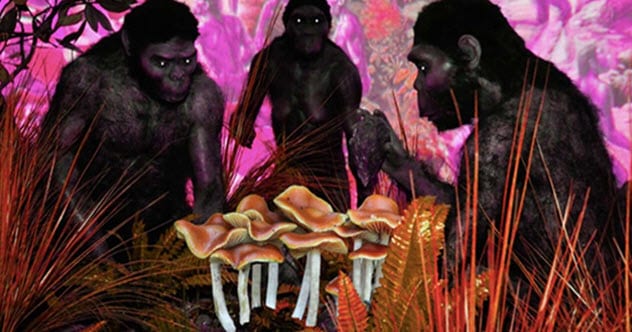
Humans had a swift evolution. Within 200,000 years, our brains doubled in size and we went from Homo erectus to Homo sapiens. Although 200,000 years seems like a long time in human years, it is short in terms of evolution.
A few decades ago, Terence McKenna proposed the “stoned ape” theory of evolution to explain the sudden evolution of Homo erectus. He suggested that humans rapidly evolved after Homo erectus added Psilocybe cubensis (magic mushrooms) to their diet after a change in climate killed off most of their regular food.
The magic mushroom is a psychedelic substance, just like marijuana. This means that Homo erectus got high in order to evolve into Homo sapiens. McKenna claimed that the mushrooms provided Homo erectus with enough energy to hunt. It also increased their libido and improved their vision.
However, the theory has been criticized because magic mushrooms are not native to Africa, so there was no way that Homo erectus could have laid their hands on Psilocybe cubensis. Besides, McKenna based his theory on a 1960s study by Roland Fischer on psychedelic drugs.
Fischer never mentioned that psychedelic drugs increased libido. Although he stated that psychedelic drugs could improve vision, some conditions had to be met. And there was no way those conditions could be met during hunting.[1]
9 The Great Chain Of Being
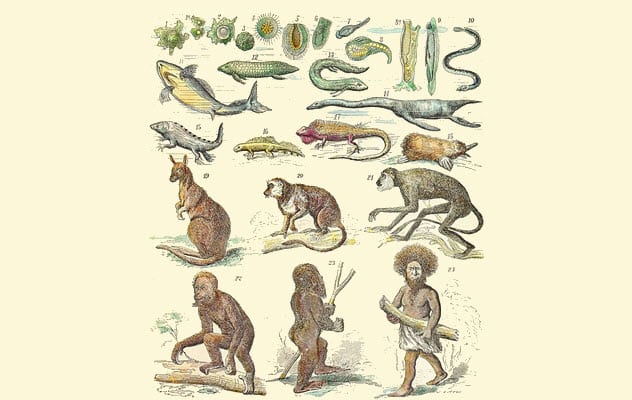
Scala naturae (“Great Chain of Being”) was proposed by Greek philosopher Aristotle. He believed that every plant and animal maintained the same features that they had when created and did not evolve into other species. He added that every plant and animal had a definite position in nature and was to serve the purpose for which it existed.
Aristotle also believed that living things could be arranged in a hierarchy—from the least to the most complex. According to Aristotle, plants are the simplest life-forms. From there, the animal chain progresses in complexity until we finally get to humans. Aristotle wrote that every creature became more perfect the higher it was on the ladder.[2]
8 Empedocles’s Theory Of Evolution
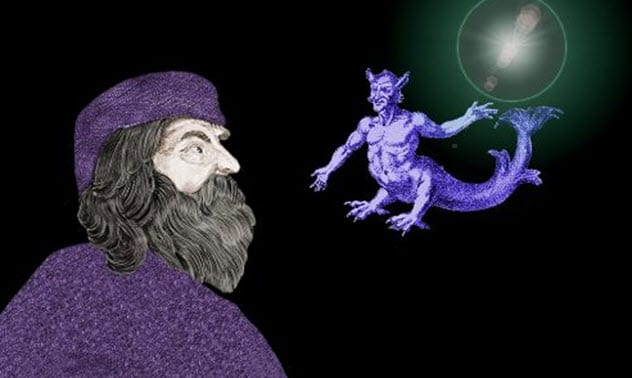
Empedocles (495 BC–435 BC) was another ancient philosopher who proposed a theory of evolution. He wrote that the universe consisted of four elements: air, water, earth, and fire. The forces of attraction and repulsion acted on the elements, causing them to create the universe and everything within.
Empedocles suggested that the action of the forces on the elements caused the creation of the first humans, who were actually a mismatch of different body organs. So we had creatures with cattle bodies and human heads, arms without shoulders, and some other weird combinations.
He proposed something akin to Darwin’s natural selection. Empedocles wrote that humans with the most desirable features survived while humans with the least desirable traits died off. However, he did not believe in evolution and the creation of new species. Instead, the creatures shed their unfavorable body parts until they were left with only the best.
Another philosopher, Lucretius (99 BC–55 BC), proposed a follow-up theory centuries later. He wrote that humans with the best features for strength, speed, or intelligence survived while the rest died off. He also added that the elements and forces that Empedocles wrote about only created humans by chance.[3]
7 Anaximander Theory Of Evolution
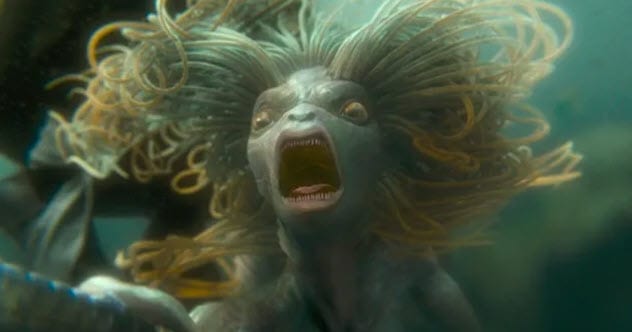
Anaximander (born 610 BC) was another Greek philosopher who proposed a theory of evolution. He wrote that a species could evolve to create another species—the sort of thing claimed by Darwin. However, Anaximander is not considered the father of evolution because he suggested that a fish birthed the first human.
Anaximander proposed his theory of evolution after observing the fetuses of several animals. He realized that the unborn offspring of almost every animal resembled a fish. So he suggested that a fish fetus could mutate into some other animal if it remained in the womb long enough. Anaximander used this theory to put forward the idea that a fish birthed the first human.
His theory of evolution becomes questionable at this point. Baby humans always need care to survive. Also, it would have been difficult to explain how a fish raised a human. But Anaximander had an answer to that. He suggested that a fish gave birth to an adult human.
We already mentioned that Anaximander believed that a fetus could mutate into another species if it remained in a fish womb long enough. He proposed that some fetuses remained in a fish’s womb for years until they turned into humans and grew past puberty. The fish later beached itself onshore where the grown humans tore themselves out of its stomach.[4]
6 Mutation Theory

The mutation theory was proposed by Dutch botanist Hugo de Vries in 1901. This idea is similar to Darwinism, except de Vries suggested that new species were created by sudden one-off mutations and not gradual changes as proposed by Darwin’s theory of evolution.
De Vries also believed that the mutations were random, while Darwin proposed that they were deliberate. De Vries thought that a new species could only be created when several offspring had the same random mutation. However, he added that a mutation in a single offspring could result in a new species in rare instances.
De Vries’s mutation theory failed to supplant Darwinism as the accepted theory of evolution. It was criticized for several reasons including the fact that it did not account for the role of nature in evolution.[5]
5 Lamarckism
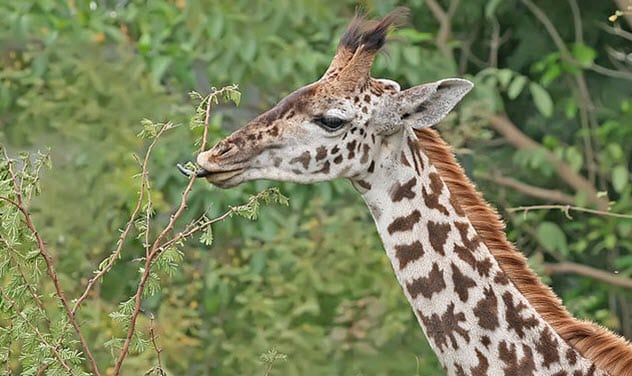
Lamarckism was proposed by biologist Jean Baptiste Lamarck in 1801. During an extensive study of invertebrates, Lamarck had noticed that every animal was somehow related. He also observed that every living animal was related to extinct fossils. So he proposed his theory of evolution. It almost seemed like Darwinism, except for some spectacular differences.
Lamarck mentioned that creatures evolved during their lifetimes to fit into their environments. For instance, he suggested a giraffe’s neck slowly grew longer as it stretched to eat leaves hanging from tree branches. The offspring inherited the longer neck, and their necks also continued to grow longer during their lifetimes. The cycle continued with the next generation.
Lamarck also believed that new life-forms started off as microbes that gradually became complex as they evolved. He also thought that these new life-forms were being created every time. Lamarckism was very much ahead of its time. However, it was not accepted because it was not detailed enough. Darwin would later publish his more elaborate On the Origin of Species in 1859.[6]
4 Al-Jahiz Theory Of Evolution
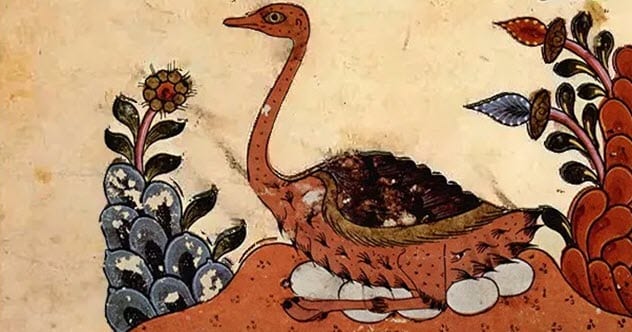
Al-Jahiz (born Abu Uthman ibn Bahr al-Kinani al-Basri in AD 776) was a Muslim scholar who proposed a theory of evolution in his book, Kitab al-Hayawan (“Book of Animals”). Al-Jahiz’s supposition was similar to Darwinism. He wrote that every creature evolved into its modern shape for survival.
Al-Jahiz added that evolution was a continuous process because the fight for survival was unending. Animals developed new features as their environments changed. This process also occurred to allow these creatures to eat other animals and avoid getting devoured themselves.
Al-Jahiz agreed that the surviving animals passed their new traits to their offspring. However, he is not considered the pioneer of evolution because he believed that God was involved in creation. His book contained the line “God makes cause of some bodies life.”[7]
3 Georges-Louis Leclerc Theory Of Evolution
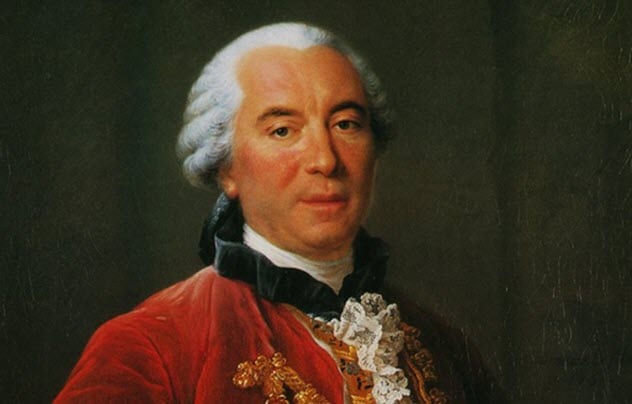
Georges-Louis Leclerc, Comte de Buffon (1707–1788), believed that the Earth was created when a comet slammed into the Sun over 70,000 years ago. Debris from the collision flew away from the Sun to create Earth. Supposedly, our planet slowly cooled and molten rock turned to dry land. Rain clouds also formed.
However, Earth was still scorching and covered with hot oceans. Buffon believed that every animal had sprung out of these hot oceans. This includes large and fully formed animals. He did not explain how they formed but stated that every animal was created from specific organic particles in a process which he called an “internal mould.”
The creatures slowly migrated away from the seaside as Earth cooled. However, the organic particles that created them soon became unavailable as they had left the area where they originated. Buffon claimed that the lack of these organic particles caused the differences observed in species spread around the world. However, he did not believe that these species could evolve into new ones.
Buffon’s theory was not accepted because we know the Earth is much older than 70,000 years. Besides, animals do not just evolve that way.[8]
2 Creationism

Creationism is the belief that the world and everything in it was created by God. The theory is based on the Bible’s Book of Genesis where God created the world in six days and rested on the seventh. Proponents of creationism do not believe that one species can evolve into another. However, they agree that species often mutated to survive in their environments.
Creationism was created to counter the pro-scientific theories of evolution, specifically Darwinism. The theory of evolution was very controversial when Charles Darwin proposed it in 1859. Some Christians considered it to be a direct threat to Christianity because it nullified the belief that God had created the world and everything in it.
Pro-creationism Christians often attacked Darwinism and even had it banned in US schools at the beginning of the 20th century. However, the science community fought back. In 1925, US schoolteacher John T. Scopes even stood trial for disobeying the ban and teaching evolution in schools.
Pope Pius XII cooled some nerves in 1950 when he declared that Darwinism does not interfere with creationism. However, he insisted that the soul of every creature is created by God.[9]
1 Theistic Evolution

Theistic evolution is a hybrid of creationism and Darwinism. The majority of its followers are Christian scientists who call themselves theistic evolutionists or Christian evolutionists. This idea was proposed to find a middle ground between the Christian and scientific theories of evolution.
Theistic evolutionists believe that God created the world, although they say that the Bible never explained how God did it. So they concluded that God created the primary materials from which the first living organisms appeared. Then these organisms evolved into every other species we have around today.
Curiously, theistic evolutionists believe that Adam was the first man. However, they say that God did not create him from dust but from some closely related but nonhuman creature like a hominid ape. They say that Adam was a part of these nonhuman creatures until God turned him into the first man.[10]
Read more interesting theories and facts about evolution on 10 Incredible Firsts In The Evolution Of Life On Earth and 10 Ways Humans Would Look If We Had Evolved Differently.








